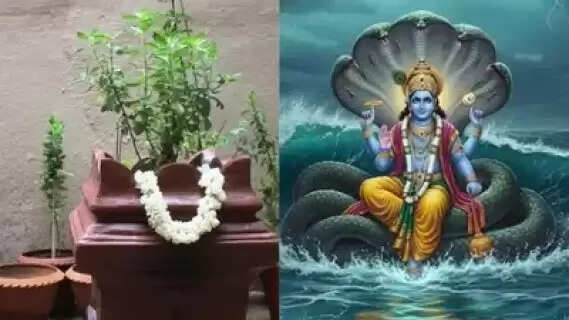
In the vast tapestry of Hindu festivals, there are a few days that pulse with a special kind of divine energy. One of the most significant is Dev Uthani Ekadashi, also known as Prabodhini Ekadashi. This is a day of awakening. After four long months of cosmic slumber, it is believed that Lord Vishnu, the preserver of the universe, finally awakens.This day marks the end of a sacred period called Chaturmas. During these four months, it's believed that Lord Vishnu rests in the cosmic ocean, and as a result, auspicious activities like weddings, housewarmings, and new ventures are traditionally put on hold. His awakening on Dev Uthani Ekadashi is like a divine green light, signaling the return of joy, celebration, and auspicious beginnings to the world. In 2025, this important day falls on Saturday, November 1st.At the heart of this festival is a profound story, a Vrat Katha, that has been told for generations. It’s a tale not just of gods and rituals, but of human nature, sacrifice, and the true meaning of devotion.The story speaks of a great king who ruled over a prosperous and happy kingdom. Every Ekadashi, the king and his queen would observe a strict fast, earning immense spiritual merit. However, there was a poor Brahmin in the kingdom who always felt a pang of sadness. He believed the only reason for his poverty was the king’s righteousness, thinking that the king’s good deeds left no misfortune for anyone else. One day, filled with desperation, the Brahmin approached the queen and made a strange request: he asked her to give him the spiritual merit she would earn from her upcoming Ekadashi fast.The queen, with a kind and generous heart, agreed. On the day of the fast, after her prayers, she made a vow and transferred all the merit she had gained to the poor Brahmin. The effect was immediate. The Brahmin's life transformed; he became wealthy and prosperous overnight. But in the royal palace, a dark cloud descended. The king and queen began to lose everything. Their fortunes dwindled until they had nothing left and were forced to leave their own kingdom in search of work.Wandering for days, they finally arrived in another kingdom and sought shelter in the home of a wealthy merchant, not realizing it was the same Brahmin they had helped. The woman of the house, who was now a great lady, hired them without recognizing them. She was preparing for the festival of Amla Navami and had invited many people for a feast.As the former queen worked in the kitchen, a peculiar old habit surfaced. She removed a single strand of hair from her head and, as a test of purity, placed it on a plate of kheer. The merchant’s wife, seeing this, became furious and locked the queen in a dark room. Later, when her husband came home, she told him about the servant’s strange and unhygienic act. Her husband, who was the Brahmin from their old kingdom, remembered seeing the old queen do this same ritual years ago. He rushed to the storeroom and found his old king and queen in a pitiable state.He fell at their feet, full of remorse and gratitude, explaining how their single act of charity had changed his life forever. The queen, with tears in her eyes, explained that by giving away their spiritual merit, they had lost everything. The merchant, filled with gratitude, begged them to take back what was rightfully theirs. He made a vow and transferred all the merit he had gained back to the queen. Instantly, the divine balance was restored, and the king and queen's fortune and kingdom returned to them.This story is a powerful reminder of the meaning of Dev Uthani Ekadashi. It teaches that the blessings we earn are meant to be shared, and that an act of selfless charity, performed on a day as holy as this, has the power to change destinies—both of the giver and the receiver. It's a day that reminds us that when goodness awakens, the world is filled with light again.

